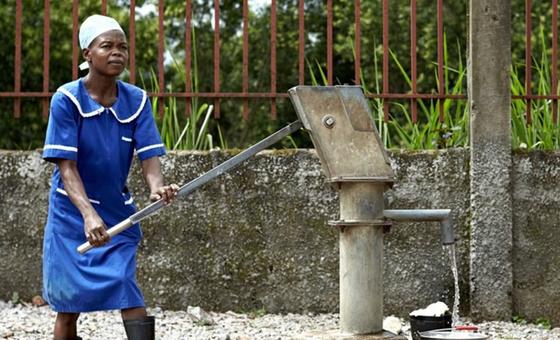Countries must ramp up investments to provide safe drinking water, sanitation and hygiene (WASH) to all people by 2030, the World Health Organization (WHO) and partners said on Wednesday in a bid to save more lives.
Although 45 per cent of countries are on track to achieve drinking water targets by the end of the decade, only a quarter are likely to meet sanitation targets.
The findings come in a report published by WHO and UN-Water, which brings together UN agencies and other organizations working on the issue.
‘An urgent crisis’
The study examines WASH access in more than 120 countries and reveals that over 75 per cent reported insufficient funding to implement related plans and strategies.
“We are facing an urgent crisis: poor access to safe drinking water, sanitation and hygiene claim millions of lives each year, while the increasing frequency and intensity of climate-related extreme weather events continue to hamper the delivery of safe WASH services,” said Tedros Adhanom Ghebreyesus, the WHO Director-General.
Ensuring that everyone on the planet has access to clean water and sanitation is one of the 17 Sustainable Development Goals (SDGs), which have a deadline of 2030.
‘Seriously off-track’
Data from the Global Analysis and Assessment of Sanitation and Drinking-Water (GLAAS) report further shows that most national policies and plans neither address the climate change risk to WASH services, nor how to make technologies and management systems more climate resilient.
Just over two thirds of countries have implemented measures to reach populations disproportionately affected by climate change. However, only about a third monitor progress or allocate funding to them.
“The world is seriously off-track to achieve SDG 6 on water and sanitation for all, by 2030. This leaves billions of people dangerously exposed to infectious diseases, especially in the aftermath of disasters, including climate change-related events,” said Gilbert F. Houngbo, the UN-Water Chair and Director General of the International Labour Organization (ILO).
Reaffirming global commitment
The partners call for all countries and stakeholders to increase support for WASH service delivery through strengthened governance, financing, monitoring, regulation, and capacity development.
The data from their report will inform the UN 2023 Water Conference, which will be held at UN Headquarters in New York in March.
It will mark the first time in 50 years that the international community will review progress and commit to renew action on water and sanitation.

